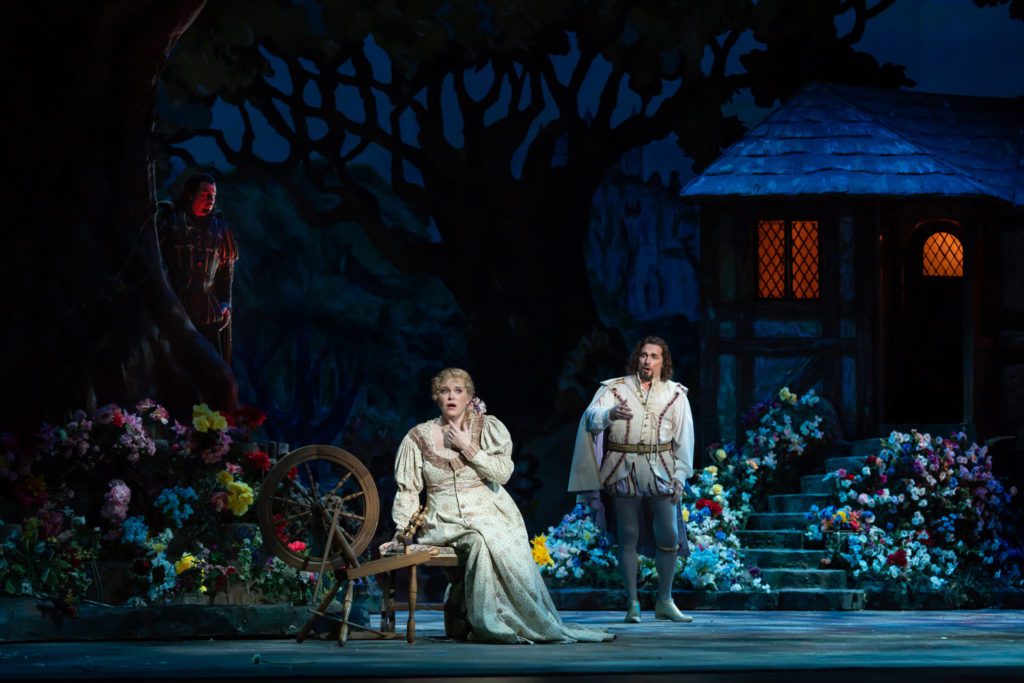‘Faust,’ in French, at the Kennedy Center
By • March 18, 2019 0 1210

This month, Washington National Opera is running two classic works of 19th-century Romanticism in the Kennedy Center Opera House, Tchaikovsky’s “Eugene Onegin” and Gounod’s “Faust,” on alternate nights.
I heard one audience member — a Russian — complain that “Onegin” seemed a little too modern, while in this production “Faust” often strays unashamedly into borderline sentimentality and heavy-handedness.
Here’s something else they share: a basically unsympathetic male protagonist who can be termed — charitably — an antihero. In fact, it may be a mistake in the titles; they could have just and justly been called “Tatiana” and “Marguerite.”
They share one other quality, which is that, for the audience, both start out slowly, taking their time, telling the story, musically and dramatically, in detail, until you’re hooked, lines and singers (so to speak). As the proceedings draw to a close, the audience seemed fully and emotionally engaged. And that’s no small achievement, since both operas weigh in on the lengthy side, with “Faust” going over three hours.
The productions certainly look different. The dramatics of “Onegin” play out in large spaces, whether in the countryside or in expansive ballrooms. “Faust” takes place in thickly decorated, densely populated sets that seem straight out of Bruegel or some 16th-century German fairy tale, leaving ample room for heaven and hell.
“Faust” is based on Goethe’s “Faust, Part One,” a hallmark of European literature. Its reputation is so weighty that it may be a little too much of a burden for the opera to carry, but, as a story, it fits opera’s need for emotional outpourings.
As the old (very old) story goes: an aging doctor named Faust bewails his inability to be the man he once was, that he cannot be the stallion of his youth. Up pops Méphistophélès in a buzz of light, smiling. You almost expect him to say, “You rang?”
What Faust (tenor Marcelo Puente) wants is his youth, the ability to romance young women, to be permanently infatuated. His new friend basically says: “I can do that, no problem. Just sign here.”
The price appears not to be too clear to Faust, but when he and his mysterious but energetic guide wander into a village celebration — tumblers tumbling, jesters jesting, magicians, puppet shows, dancing and music — he knows who he wants, the beautiful, very grown-up Marguerite, unsullied, strong-minded. She’s protected by her warrior brother, Valentine, and courted by others, including Siebel, a young boy.
Goaded and helped by his devilish pal — who seems averse to crosses — Faust with great insistency courts Marguerite until, with some jewelry glitter and magical help, she succumbs. The results are tragic to a fault: Faust disappears, the brother is off to war, she has a baby (which she gives up and eventually kills), Faust kills the brother and Marguerite is shunned, then condemned.
But it’s Marguerite who raises her spirituality, her humanity, by embracing the forgiveness of God as Faust descends to much lower depths, seeking to bring Marguerite with him. She — stoutly and with grandeur and in great voice — refuses, and ascends.
The courtship is conducted at full breath and, in soprano Erin Wall’s case, a searing, gorgeous voice that says a lot about singing as acting. Her range takes you to heartbreak when she succumbs, to empathy when she finds the basement at the bottom of the cell and to grandeur when she ascends.
Basso Raymond Aceto is something of a scene stealer, as devils are wont to be. He finds the comedy in humanity and joins in even while fending off Deborah Nansteel’s Dame Marthe. Mezzo-soprano Allegra De Vita, playing the “pants” role of the steadfast Siebel, makes a moving, steadying impact whenever she’s on stage.
In both “Onegin” and “Faust,” we find something that’s less and less surprising today, onstage and in real life. If the setting in “Faust” seems not quite real, it certainly reflects reality. In these two stellar, engaging productions, we find, as we do more every day, that it’s the heroines who are the heroes.

